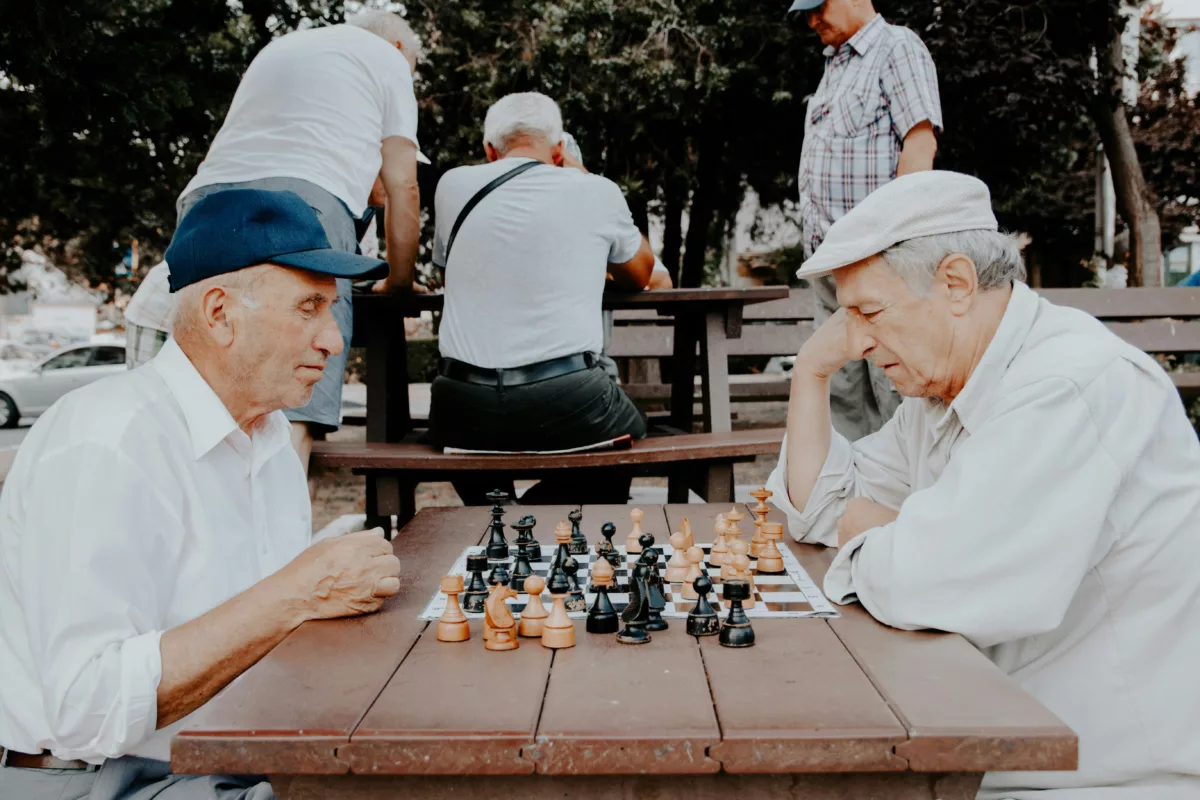As we navigate the later chapters of life, the significance of maintaining a sharp and nimble mind cannot be overstated. Brain exercises for seniors can help people in the golden years improve some of the unfortunate cognitive declines they can experience.
Today we will discuss brain exercises for the elderly, shedding light on their manifold benefits, distinguishing between brain exercises and mere games, and suggesting engaging, practical activities aimed at stimulating cognitive functions. Let’s begin?
What are brain exercises?

Source: Unsplash
Brain exercises for the elderly encompass a broad spectrum of activities designed to challenge and engage different aspects of cognitive function, such as memory, attention, problem-solving, and flexibility in thinking.
Unlike passive activities, these exercises require active engagement, prompting the brain to form new neural pathways, adapt to novel challenges, and reinforce existing connections.
This process, often referred to as “neuroplasticity,” underscores the brain’s remarkable ability to reorganize itself by forming new neural connections throughout life, particularly when stimulated by new learning and experiences.
The key is consistent engagement; just as muscles require regular exercise to stay strong, the brain benefits from frequent, varied mental challenges to maintain and enhance cognitive function.
Brain Exercises vs. Brain Games
While the terms “brain exercises” and “brain games” are often used interchangeably, there is a distinct difference between the two, particularly regarding their impact on cognitive abilities. Brain exercises are structured, targeted activities designed specifically to improve cognitive functions.
They are based on scientific research and often follow methodologies proven to enhance certain mental capabilities. These exercises are akin to a workout regimen for the mind, tailored to strengthen specific areas of cognitive performance.
On the other hand, brain games, such as puzzles, trivia, and word games, can be enjoyable and mentally stimulating, but they may not always provide the same level of cognitive benefit as structured brain exercises.
Benefits of brain exercises for seniors

Source: Unsplash
The adoption of regular brain exercises carries a multitude of benefits for seniors, transcending mere entertainment to significantly impact various aspects of cognitive and emotional well-being:
- Delaying Cognitive Decline: Engaging in brain exercises can help slow down the natural decline in cognitive functions associated with aging. Activities that challenge the mind stimulate neural plasticity, leading to the strengthening of neural pathways and potentially delaying the onset of dementia and other age-related cognitive impairments.
- Improving Memory: Regular mental workouts can enhance memory retention and recall. By practicing memory exercises, seniors can improve their ability to store and retrieve information, which is crucial for daily independence and quality of life.
- Increased Focus and Attention: Consistent engagement in cognitive tasks helps improve concentration and the ability to sustain attention on specific tasks, thereby enhancing overall cognitive efficiency.
- Emotional Well-being: Mental stimulation through brain exercises can also contribute to better emotional health. The sense of achievement from overcoming challenges and learning new skills can boost self-esteem and reduce feelings of depression and anxiety.
By integrating brain exercises into their daily routines, seniors can enjoy these wide-ranging benefits, leading to a more active, engaged, and fulfilling life.
5 brain exercises for seniors
Physical Exercise
While not often categorized strictly as a brain exercise, physical activity is crucial for cognitive health. Activities such as walking, swimming, yoga, and Tai Chi not only promote physical well-being but also have a positive impact on brain function.
These exercises increase blood flow to the brain, which can help enhance cognitive abilities and reduce the risk of cognitive decline.
Moreover, physical exercise is known to stimulate the production of growth factors, chemicals in the brain that affect the health of brain cells, the growth of new blood vessels in the brain, and even the abundance and survival of new brain cells.
Crossword Puzzles
Crossword puzzles are a classic brain exercise that challenges vocabulary and memory. Engaging in this activity regularly can enhance verbal skills and encourage lateral thinking. Crosswords vary in complexity, allowing seniors to choose puzzles that match their skill level, providing a satisfying challenge without causing frustration.
Jigsaw Puzzles
Assembling jigsaw puzzles is a fantastic way to boost cognitive abilities, particularly spatial recognition and problem-solving skills. This activity requires concentration and patience, as well as the ability to recognize patterns and colors. It can be a relaxing way to pass the time while still providing a meaningful cognitive workout.
Get a Hobby
Pursuing a hobby is an excellent way for seniors to engage in brain exercises. Activities like painting, knitting, playing a musical instrument, or gardening not only provide enjoyment but also offer cognitive challenges. Learning new skills and techniques stimulates the brain, fostering creativity and problem-solving abilities.
Hangout with Friends
Social interaction plays a vital role in maintaining cognitive health.
Activities such as playing board games, participating in book clubs, or simply engaging in stimulating conversations with friends can serve as effective brain exercises. These social activities encourage communication, memory recall, and the use of reasoning skills, all of which contribute to cognitive well-being.
Brain supplements for seniors
In addition to physical and mental exercises, certain supplements have gained attention for their potential to support brain health in seniors. Some nutrients and natural compounds have been associated with cognitive improvements:
- Omega-3 Fatty Acids: Found in fish oil and flaxseeds, omega-3s are essential for maintaining brain health. They are believed to contribute to cell membrane flexibility, supporting brain cell communication and potentially reducing the risk of cognitive decline.
- Vitamin D: Often called the “sunshine vitamin,” Vitamin D has been linked to cognitive function. Deficiencies in Vitamin D are associated with an increased risk of cognitive decline, making supplementation potentially beneficial for seniors, especially those with limited exposure to sunlight.
- Antioxidants: Vitamins C and E are antioxidants that help combat oxidative stress, a factor that contributes to brain aging. Foods rich in these vitamins or supplements can support brain health by protecting cells from damage.
- B Vitamins: B vitamins, particularly B6, B12, and folic acid, play roles in brain health by reducing homocysteine levels in the blood, high levels of which are associated with an increased risk of cognitive decline.
- Ginkgo Biloba: Often used in traditional medicine, Ginkgo Biloba is reputed to improve blood circulation and cognitive function, although scientific evidence is mixed.
It’s important for seniors to consult with healthcare professionals before starting any new supplement regimen, especially considering potential interactions with existing medications and conditions.
A balanced diet, rich in fruits, vegetables, lean proteins, and whole grains, remains the foundation of brain health, with supplements potentially serving as an adjunct to support specific nutritional needs.

Frequently asked questions
What is the best brain booster for seniors?
The best “brain booster” is a combination of a healthy lifestyle, including a balanced diet, regular physical exercise, and engaging in mentally stimulating activities. Supplements like omega-3 fatty acids and vitamins B, D, and E may support brain health, but it’s essential to consult with a healthcare professional for personalized advice.
How can older adults improve brain function?
Older adults can improve brain function by staying physically active, engaging in regular brain exercises (like puzzles, learning new skills, and social activities), maintaining a healthy diet, getting enough sleep, and managing stress. Social interaction and emotional well-being also play critical roles in cognitive health.
What is the number one exercise for the brain?
While there’s no single “number one” exercise for the brain, activities that challenge and engage multiple cognitive functions simultaneously are highly beneficial. This can include learning a new language or instrument, engaging in complex problem-solving activities, or participating in social and community activities that stimulate both the mind and social interaction.
How do you keep your brain sharp in old age?
Keeping the brain sharp in old age involves a holistic approach: regular mental stimulation through puzzles, reading, and hobbies; physical activity such as walking, yoga, or tai chi; social engagement; a healthy diet rich in antioxidants and omega-3s; and adequate sleep and stress management. Consistency in these practices is key to maintaining cognitive health over time.
This article aimed to provide seniors and their caregivers with a comprehensive guide to maintaining cognitive health through brain exercises, lifestyle choices, and potentially supportive supplements.
We hope we could help you to understand some of the pillars of brain exercises for seniors. Don’t forget to check our blog out to learn more about nootropics and cognition!
Disclaimer: The information provided in this article is for informational purposes only and is not intended to substitute for professional medical advice, diagnosis, or treatment.

